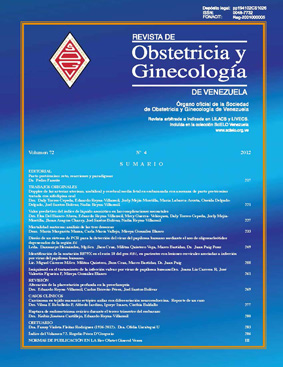Etapa fetal de la programación. Estrategias para un buen control preconcepcional y prenatal
Keywords:
Programación Fetal, Control Prenatal, Nutrición Materna, Fetal Programming, Prenatal Care, Maternal NutritionAbstract
Fetal programming assumes that pregnancy is the period of greatest susceptibility to acquire changes in the cell nucleus as an adaptive response to the presence of certain morbid processes, which, if maintained over time, will be expressed as pathologies in the child, adolescent or adult such as obesity, dyslipidemia, metabolic syndrome, high blood pressure, ischemic heart disease, metabolic diseases such as type 2 diabetes mellitus, psychiatric diseases such as schizophrenia, anxiety, bipolarity, depression, and other neurological diseases such as autism, epilepsy, Alzheimer, and Parkinson’s disease. The objective was to analyze situations to be considered during the preconception, prenatal and postnatal consultation, in order to have an optimal environment in the first 280 days of the individual’s life. Conclusions: The correct gynecological and obstetric control should be oriented to look for a healthy adult, considering the fetus as a patient. A correct programming of the healthy adult begins in guaranteeing the health of the mother before and during pregnancy, childbirth and the puerperium.
Downloads
References
Hernández-Rojas PE, Hernández B A, García de Y M. ¿Podemos los obstetras programar una sociedad más sana? Rev Obstet Ginecol Venez [Internet]. 2017 [consultado 22 de octubre de 2020]; 77(2): 133-142. Disponible en: http://www.sogvzla.org.ve/sogvzla20186/cms/svcobtenerpdfrevista.php?id=0000000085&tipo=normal&fila=9
Schuurmans C, Kurrasch DM. Neurodevelopmental consequences of maternal distress: what do we really know? Clin Genet 2013; 83:108-117. doi: 10.1111/cge.12049.
Godfrey K, Barker D. Fetal programming and adult health. Public Health Nutrition. 2001; 4(2B): 611-624. doi: 10.1079/phn2001145
Bradley E, Cadwell P, Underwood L. Autism Spectrum Disorder. In Tsakanikos E, McCarthy J editors. Handbook of psychopathology in intellectual disability: research, practice and policy. Toronto: Springer; 2014.p. 237-264. doi I:10.1007/978-1-4614-8250-5_16
Hernández-Rojas PE, Infranco M, D’Intinosante D, Gámez G, González O, Hernández N. Aumento excesivo de peso durante el embarazo y trastorno del espectro autista [Internet]. Valencia: Repositorio Institucional de la Universidad de Carabobo; 2015 [consultado 6/8/2020]. Disponible en: http://riuc.bc.uc.edu.ve/handle/123456789/4413
Moreno-Villares JM, Dalmau-Serra J. Alteraciones en la nutrición fetal y efectos a largo plazo: ¿algo más que una hipótesis? Acta Pediatr Esp [Internet]. 2001 [consultado 22 de octubre de 2020]; 59(10): 573-581. Disponible: https://www.researchgate.net/publication/242666452_Alteraciones_en_la_nutricion_Alteraciones_en_la_nutricion_fetal_y_efectos_a_largo_fetal_y_efectos_a_largo_plazo_algo_mas_que_una_plazo_algo_mas_que_una
Celis Y, Gouveia G, Lezama H, Valbuena D, García de Y M, Henríquez M, et al. Nutrición en gestantes y aumento exagerado de peso según estratos socioeconómicos, experiencia en Aragua, Venezuela. JONNPR. 2018; 3(7):484-496. doi: https://doi.org/10.19230/jonnpr.2496.
Aguilar-Barradas M, Méndez G, Guevara J, Caballero L. Mortalidad perinatal hospitalaria y su relación con la calidad de la atención prenatal. Rev Med IMSS [Internet] 2005 [consultado 30 de septiembre de 2021]; 43(3): 215-220. Disponible: https://www.redalyc.org/pdf/4577/457745542005.pdf
Vohr B, Poggi Davis E, Wanke C, Krebs N. Neurodevelopment: The impact of nutrition ans inflammation during preconception and pregnancy in low-resource settings. Pediatrics 2017 139(s1): s38-s50. doi: 10.1542/peds.2016-2828F.
Black R, Victora C, Walker S. Maternal and child nutrition study group. Maternal and child undernutrition

